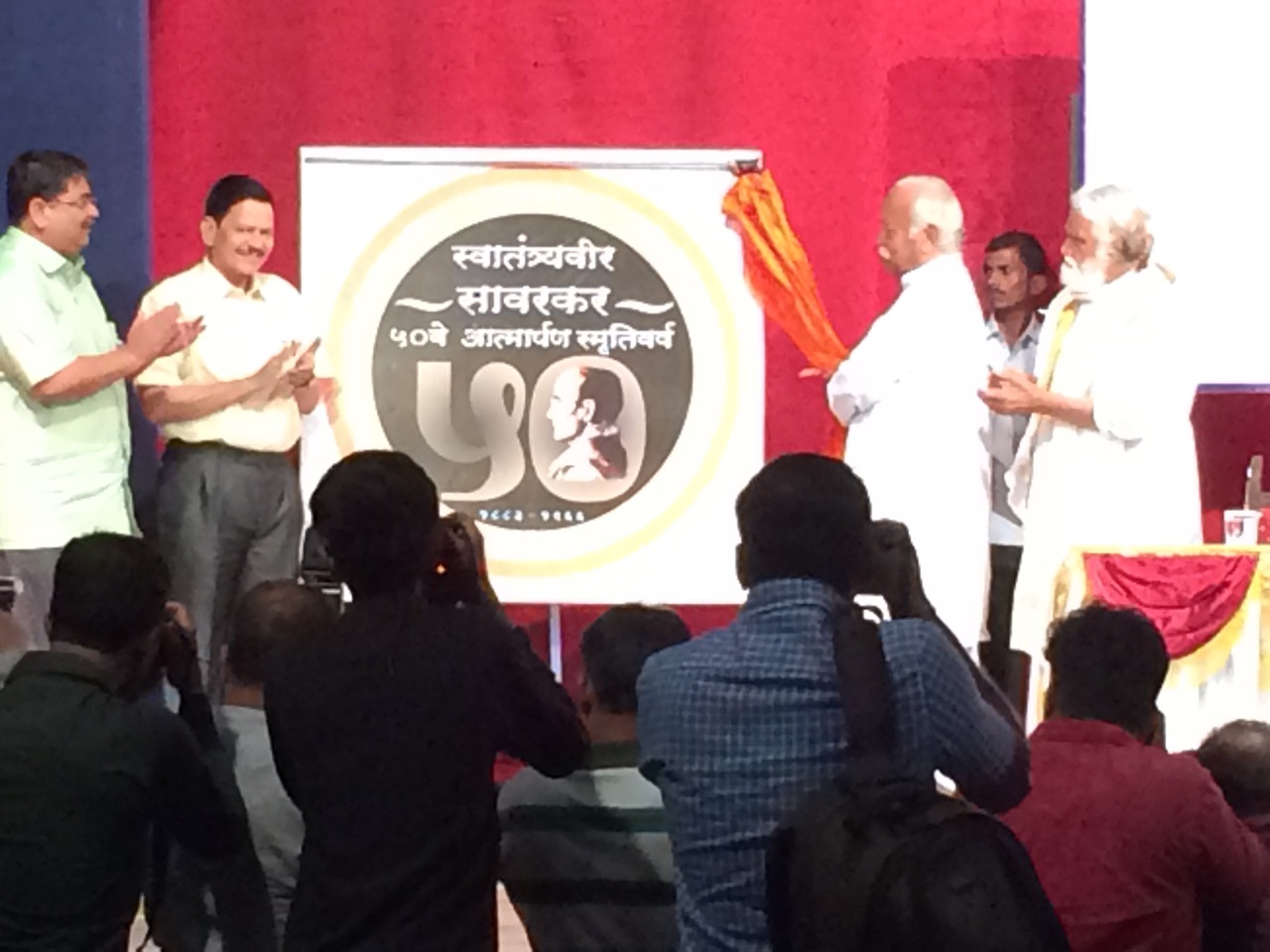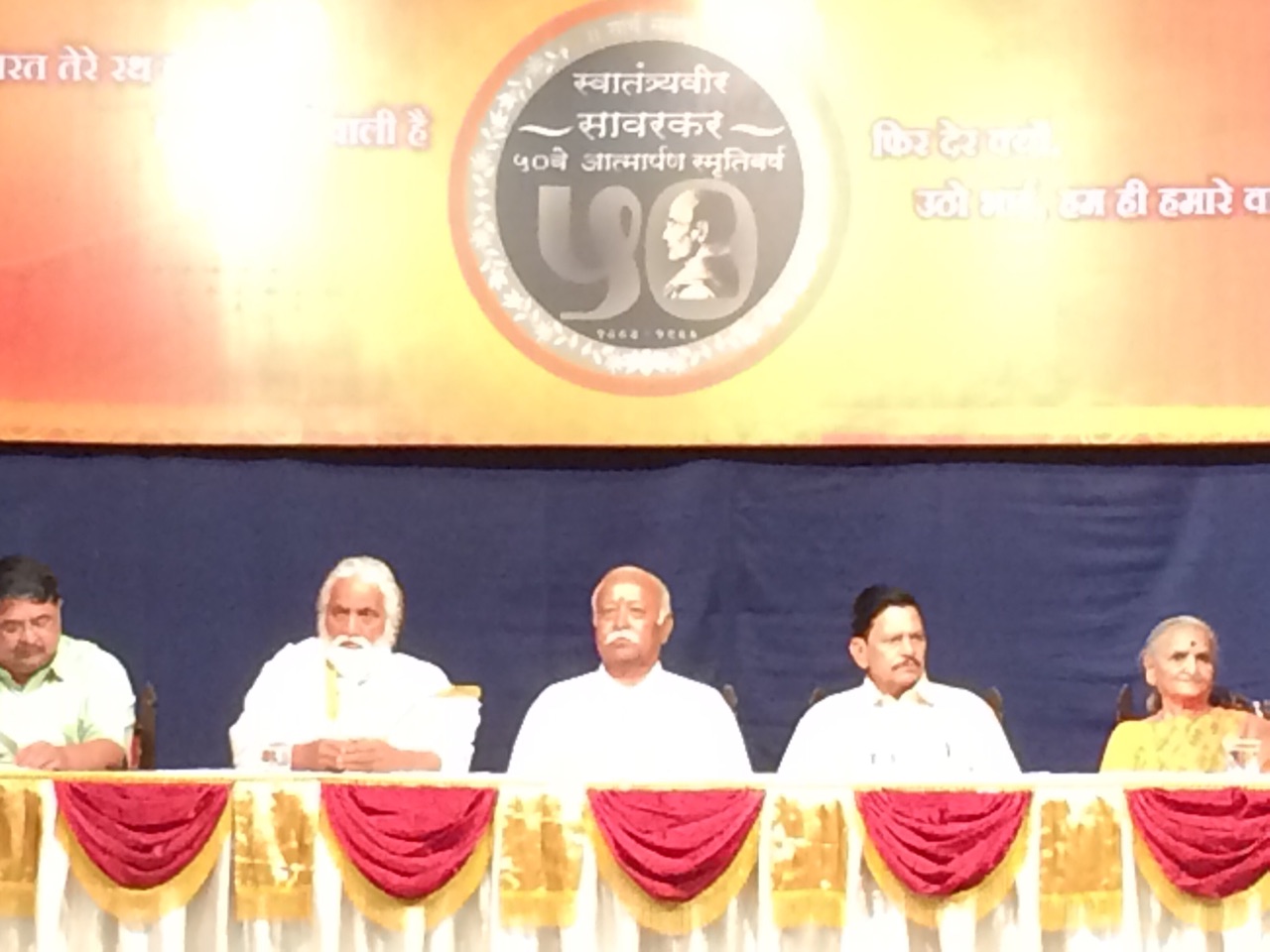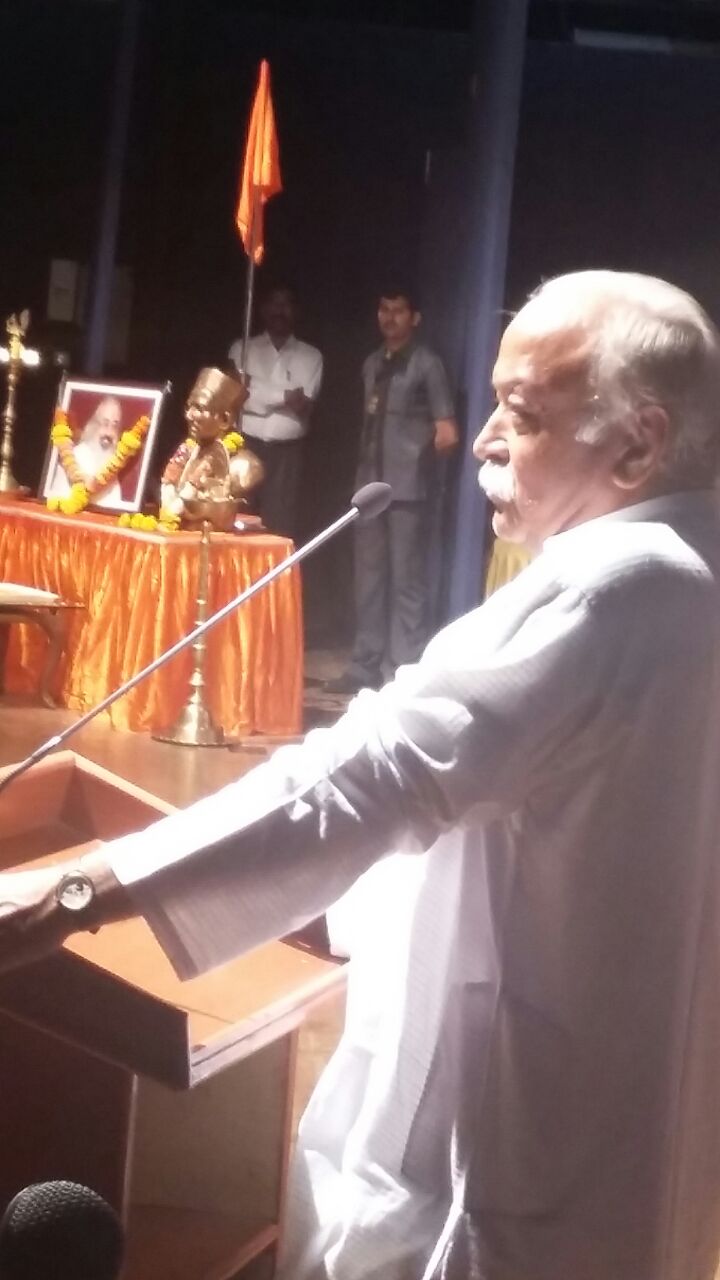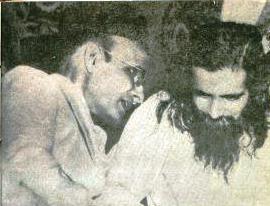RSS Sarasanghachalak Bhagwat inaugurates Veer Savarkar’s 50th Punyatithi Smruti Varsh Ceremony in Mumbai
Date posted: February 26, 2015 | Short URL: http://samvada.org/?p=25107Mumbai February 26: RSS Sarasanghachalak Mohan Bhagwat inaugurated 50th Punyatithi SmrutiVarsh ceremony, remembering the legacy of great freedom Fighter Swatantrya Veer Vinayak Damodar Savarkar in Dadar Mumbai on Thursday evening.
RSS Sarasanghachalak Mohan Bhagwat said,” accepting diversity has been a unique quality of Indians”.
In his speech in Marathi, Bhagwat said “Dharma does not mean puja. It is a combination of character and responsibilities, We never forced anyone to change their worship habits”.
Mohan Bhagwat applauded Veer Savarkar for his fierce nationalism, Bhagwat bemoaned that the country did little to recognise his contribution to nation-building. “What did we, the society give Savarkar? He was dragged into a shameful court case after the Independence. Savarkar’s plaque at the Cellular Jail at Andamans was also removed,” he said.
Former minister from Vidarbha, Jambuwantrao Dhote, who also spoke, said, “Most of the Christians and Muslims here were originally Hindus.”
Veer Savarkar had close association with RSS, especially MS Golwalkar, the second RSS Sarasanghachalak.
Vinayak Damodar Savarkar:
Vinayak Damodar Savarkar (28 May 1883 – 26 February 1966) was an Indian pro-independence activist, politician as well as a poet, writer and playwright. He advocated dismantling the system of caste in Hindu culture, and reconversion of the converted Hindus back to Hindu religion. Savarkar created the term Hindutva, and emphasised its distinctiveness from Hinduism which he associated with social and political communalism. The stated aim of Savarkar’s Hindutva was to create an inclusive collective identity. The five elements of his philosophy were Utilitarianism, Rationalism and Positivism, Humanism and Universalism, Pragmatism and Realism.
Savarkar’s revolutionary activities began while studying in India and England, where he was associated with the India House and founded student societies including Abhinav Bharat Society and the Free India Society, as well as publications espousing the cause of complete Indian independence by revolutionary means. Savarkar published The Indian War of Independence about the Indian rebellion of 1857 that was banned by British authorities. He was arrested in 1910 for his connections with the revolutionary groupIndia House. Following a failed attempt to escape while being transported from Marseilles, Savarkar was sentenced to two life terms of imprisonment totalling fifty years and was moved to the Cellular Jail in the Andaman and Nicobar Islands, but released in 1921.
While in jail, Savarkar wrote the work describing Hindutva, openly espousing Hindu nationalism. In 1921, under restrictions after signing a plea for clemency, he was released on the condition that he renounce revolutionary activities. Travelling widely, Savarkar became a forceful orator and writer, advocating Hindu political and social unity. Serving as the president of the Hindu Mahasabha, Savarkar endorsed the ideal of India as a Hindu Rashtra and opposed the Quit India struggle in 1942, calling it a “Quit India but keep your army” movement. He became a fierce critic of the Indian National Congress and its acceptance of India’s partition. He was one of those accused in the assassination of Indian leader Mohandas Karamchand Gandhi and was acquitted in the trial.
The airport at Port Blair, Andaman and Nicobar’s capital, has been named Veer Savarkar International Airport. The commemorative blue plaque on India House fixed by the Historic Building and Monuments Commission for England reads “Vinayak Damodar Savarkar 1883-1966 Indian patriot and philosopher lived here”
Vinayak Damodar Savarkar, commonly known as Swatantryaveer Savarkar was a fearless freedom fighter, social reformer, writer, dramatist, poet, historian, political leader and philosopher. He remains largely unknown to the masses because of the vicious propaganda against him and misunderstanding around him that has been created over several decades. This website attempts to bring the life, thought, actions and relevance of Savarkar before a global audience.
- The first political leader to daringly set Absolute Political Independence as India’s goal (1900).
- The first Indian political leader to daringly perform a bonfire of foreign (English) clothes (1905).
- The first Indian to organize a revolutionary movement for India’s Independence on an international level (1906).
- The first Indian law student who was not called to the English Bar despite having passed his examination and observed the necessary formalities, for his activities to seek India’s freedom from the British (1909).
- The only Indian leader whose arrest in London caused legal difficulties for British Courts and whose case is still referred to in the interpretations of the Fugitive Offenders Act and the Habeas Corpus (Rex Vs Governor of Brixton Prison, ex-parte Savarkar)
- The first Indian historian whose book on the 1857 War of Independence was proscribed by British Authorities in India even before its publication. The Governor General had asked the Postmaster General to confiscate copies of the book six months before the book was officially banned (1909).
- The first political prisoner whose daring escape and arrest on French soil became acause celebre in the International Court of Justice at The Hague. This case was mentioned in many International Treaties at that time (1910).
- The first graduate whose degree was withdrawn by an Indian University for striving for India’s freedom (1911).
- The first poet in the world who, deprived of pen and paper, composed his poems and then wrote them on the prison walls with thorns and nails, memorized ten thousand lines of his poetry for years and later transmitted them to India through his fellow-prisoners who also memorized these lines.
- The first revolutionary leader who within less than 10 years gave a death-blow to the practice of untouchability in the remote district of Ratnagiri while being interned there.
- The first Indian leader who successfully started –
- A Ganeshotsava open to all Hindus including ex-untouchables (1930).
- Interdining ceremonies of all Hindus including ex-untouchables (1931).
- “Patitpavan Mandir”, open to all Hindus including ex-untouchables (22 February 1931).
- A cafe open to all Hindus including ex-untouchables (01 May 1933).
- The first political prisoner in the world who was sentenced to Transportation for Life twice, a sentence unparalleled in the history of the British Empire.
- The first political leader to embrace death voluntarily by way of Atma Samarpan in the highest tradition of Yoga (1966).



